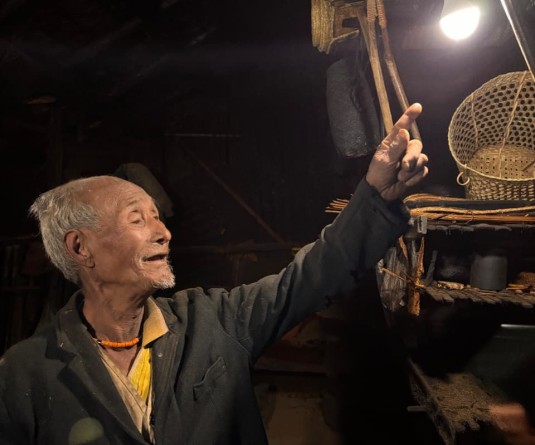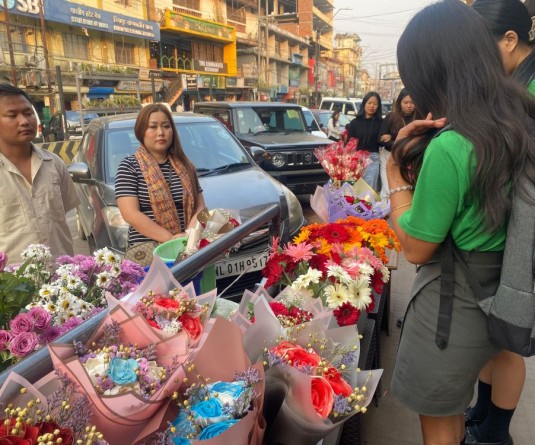A person from Lahe township, under the Naga Self-Administered Zone of Myanmar tabulates and oversees loading of goods in a truck from a general store just below the International Trade Centre Dan, in Pangsha under Noklak district. (Morung Photo)

Imti Longchar
ITC Dan | May 27
A Toyota Hilux and three Mahindra Bolero pick-up truck have just arrived at a general store just below the International Trade Centre (ITC) Dan from Lahe township under Myanmar. Burmese bikes also saunter in to carry back supplies for their villages and families.
This store, run by Khunyu, a resident of New Pangsha village has become a crucial lifeline amidst the severe hardships faced by the Naga people and other ethnic groups in Lahe township under the Naga Self-Administered Zone of Myanmar and beyond.

The dire situation arising out of the ongoing civil war has left the hundreds of Naga villages in a state of desperate need. The basic struggle has reached a critical point with the ongoing conflict rendering the usual supply routes from Hkhamti impassable due to road blockades by the military Junta, People’s Defence Force (PDF) and other rebel groups along the highways.
As the trucks are loaded with essential commodities -rice, cooking oil, biscuits, soaps, pulses, petrol, diesel, aluminum cooking pots and more- the owner of the pick-up trucks who is a businessman from Lahe, a Chinese national, provides a sobering overview of the situation.

“There is no government in Myanmar for the people,” he says, shaking his head. “The villages are reeling due to lack of essential commodities and the exorbitant increase in prices. It’s a struggle just to get basic food items.”
According to the businessman, who preferred to remain anonymous, a gallon of petrol (4 litres) which usually cost 10-12 thousand Myanmar currency is now 30-40 thousand. A 40-kilo bag of rice is now 1,40,000 Myanmar currency or more. Before the civil war, it was around 30-40 thousand Kyat.

“Prices for every single product have tripled or become more. It is increasing and increasing and never coming down,” he highlights.
The businessman informs that the issue is not because of lack of products or essential commodities in Myanmar but because of logistical nightmare and the risk involved. He says it takes a week or more to bring in supplies to Lahe from Hkhamti and beyond with “hundreds of check gates” erected by the military Junta, PDF and other rebel forces.
“Road blockades along these routes have become so unpredictable that even if our transport carriers safely pass through a military controlled area, the next town or area may be under the control of PDF or some other rebel groups and could have multiple road blockades,” he points out.

90 km of rough terrain
The painstaking drive from Lahe township to ITC Dan, which is around 90 kilometres of rough terrain, takes 5-6 hours for the empty pick-up trucks to reach the Indian side of the border. On full load, it will take around 8-9 hours, given that the weather condition is good and there is no rain.
This route has become critical for transporting goods to the Naga villages and towns in Myanmar. Vehicles coming from Myanmar side are not allowed beyond the ITC Dan with the Assam Rifles stationed at the border keeping a check on the vehicles and people coming in and out of the Indian territory.
Non-functional ITC
It is ironical that the ITC, which is intended to facilitate cross-border trade and improve economic ties, remains non-functional due to a number of factors including negligence. In stark contrast is the bustling activity right below at the general store, where pick-up trucks and Burmese bikes from Myanmar line up daily to procure essential supplies.
Owner of the general store, Khunyu, who is also a social worker-cum-public leader, says he established the store at ITC Dan three months back with the specific goal of helping the Naga people in Myanmar procure essential commodities. For the people coming from Myanmar side, he sells goods at wholesale price, with the hope of alleviating some of the financial burdens faced by the Myanmar Nagas.
“The government established the ITC Dan in 1996 but it is still non-functioning. So, we have to function something similar to the ITC by ourself in order to facilitate our Naga brethren in Myanmar. With this in mind, I am operating the store with encouragement of the Pangsha public here,” Khunyu underscores.
Monsoon & other challenges
However, the incoming monsoon season threatens this crucial lifeline. Heavy rains are expected to cause landslides and flooding making the already precarious road impassable for the transport vehicles to ply.
Without this lifeline, the Nagas of Myanmar would face even more severe shortages, aggravating their already dire living conditions as there are no other motorable routes to ferry essential commodities for the Nagas of Myanmar from the Indian side.
Besides the monsoon challenges, there is an even greater threat- the simmering tension amongst the Naga political groups operating around the area and the presence of the Indian security forces at ITC Dan.
While there has been a semblance of peace for some time, there is palpable tension among the community given that any rise in conflict could possibly lead to the shutdown of this critical international route. There have been more than half a dozen firing incidents in ITC Dan area with the most recent on March 9, 2021.
Reports of the Yung Aung-led NSCN (K) group camped at Pounyu village and the NSCN (K) Niki group at Woilan Kingphu village are already drawing tension. Both the Khiamniungan Naga villages under Lahe township of Myanmar are just kilometres away from ITC Dan.
Civil society organisations and tribal bodies of Noklak district including the Khiamniungan Tribal Council, the Pangsha Public Organization have been asking the Naga political groups operating along the border to move out of public areas and shun violence.
“If tension rise, the immediate repercussion will likely be the closure or restrictions on the border route. This would be devastating, as it is the only channel for essential supplies to Lahe and beyond,” says an observer stationed at ITC Dan.






